Truth, Solidarity, and Repair: Haiti & the Global Movement for Reparations
Pou sit entènèt kreyòl ayisyen an, klike la.
In 1804, enslaved Haitians evicted their French colonial masters and founded a free nation. But two decades later the French returned, threatening to invade unless Haiti agreed to pay “reparations” for French financial losses, including the value of the lives of the formerly enslaved. Faced with French warships off its coast, Haiti was forced to agree. And for generations it has paid this so-called “Independence Debt” to the descendants of its former enslavers, a ransom for freedom that amounted to hundreds of millions of dollars.
2025 marks the 200 year anniversary of this injustice. The catastrophic impacts of the “Independence Debt” on Haiti’s development and additional vestiges of colonialism on the Haitian economy and society continue to reverberate today.
The 2025 Dash Conference centered Haiti as both a symbol and site of global injustice and revolutionary possibility. Drawing from the country’s historic struggle for Black sovereignty and its ongoing fight for reparations, panelists explored how Haiti’s Independence Debt continues to shape the political, economic, and social conditions of the nation. Across panels, experts called for bold legal strategies, community-led advocacy, and international accountability to correct over two centuries of systemic harm. This year’s conference was co-sponsored by the Institute for Justice and Democracy in Haiti.
To listen to the discussions in Haitian Creole, click here.
Opening Keynote
Former First Lady of Haiti, Madame Mildred Aristide, delivered a compelling keynote that delved into the turbulent legacy of the 2004 coup—a critical juncture in Haiti’s history that was, in part, a reaction to President Aristide’s bold pursuit of restitution for the country’s so-called “Independence Debt” in 2003. In her address, Madame Aristide charted the longstanding struggle to assert Haiti’s legal claims and underscored how achieving restitution is not merely a matter of historical justice but a vital step toward establishing a stable and prosperous future for all Haitians.
-
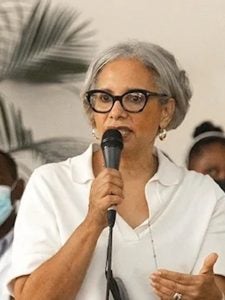
Former First Lady of Haiti and American lawyer
Madame Mildred Trouillot-Aristide
Panel One—Haiti’s “Independence Debt” and the Legacy of Oppression
The story of Haiti’s “Independence Debt” is not just one of unequal bargaining power—it is the foundation of a deliberate and systemic campaign to suppress Haiti’s potential as the world’s first Black republic. In 1804, the Haitian people fought for and won their independence from France. But Haiti’s success threatened the white supremacist system of enslavement and colonization upon which the powers-that-were had built their wealth and influence. So, in 1825, when the French military returned—with its warships ready in Haiti’s ports—to demand a payment of 150 million francs in exchange for recognition of Haiti’s hard-won independence, Haiti had no choice but to agree. France used the money from this “Independence Debt” to compensate the enslavers for their “losses”: the value of the Haitian land and the Haitian people who had just won their freedom from being treated as property. However, this “Debt” was not merely a financial burden; it was a calculated act of economic warfare designed to cripple Haiti’s development and ensure its subjugation.
This opening panel set the historical foundation of the conference, tracing Haiti’s “Independence Debt” to France in 1825 and its devastating ripple effects across centuries. Historian Dr. Leslie Alexander framed the indemnity as a deliberate act of economic warfare, rooted in white supremacy and colonial retaliation against Black liberation. Panelists emphasized that reparations must begin by confronting how Haiti—after defeating Napoleon—was punished, not celebrated. Dr. Peter James Hudson underscored Citibank’s central role in entrenching U.S. financial imperialism, calling for access to hidden archives and greater scrutiny of the legal structures that enabled predatory lending. Author and researcher Jake Johnston illustrated how Haiti’s enforced debt repayments created structural underdevelopment and seeded the “aid state” model, where foreign funding replaces sovereignty. Dr. Jemima Pierre emphasized the ideological function of racial capitalism and Western contempt for Haitian self-determination, arguing that the legacy of U.S. and UN occupation continues to erase Haiti’s agency. The conversation situated Haiti as both a unique and universal case—one that encapsulates the global struggle for Black reparations and anti-colonial justice.
-

Dr. Martin Luther King, Jr. Professor of History at Rutgers University; author of Fear of a Black Republic: Haiti and the Birth of Black Internationalism in the United States
Dr. Leslie Alexander
-
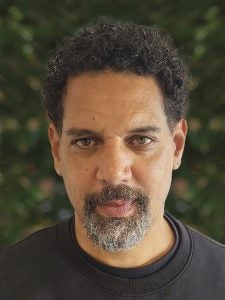
Associate Professor, Dept of Geography at the University of British Columbia
Dr. Peter James Hudson
-
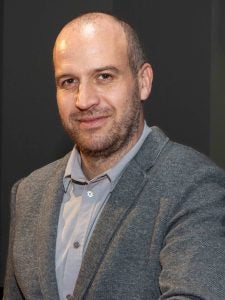
Director of International Research at the Center for Economic and Policy Research; author of Aid State: Elite Panic, Disaster Capitalism, and the Battle to Control Haiti
Jake Johnston
-

Professor of Global Race in the Institute of Race, Gender, Sexuality and Social Justice (GRSJ) at the University of British Columbia; Member of Black Alliance for Peace; and Member of the Working and Reflection Group on the Restitution and Reparation of Haiti at the State University of Haiti (UEH)
Dr. Jemima Pierre
-

OLLI Institute, University of Massachusetts, History Instructor
Charlot Lucien (moderator)
Fireside Chat with Charlot Lucien
This discussion re-imagined Haiti’s trajectory had it not been shackled by the crippling indemnity imposed by France after its hard-won independence. As the first Black republic, a trailblazer in the abolition of slavery, and an inspiration to other colonized Black nations, an unburdened Haiti could have forged its legacy as a beacon of resilience, autonomy, and possibility. This conversation with Charlot Lucien delved into how a debt-free Haiti might have flourished as a powerful economic and cultural force, pioneering innovation and social progress. It celebrated Haiti’s revolutionary spirit and explored the ripple effects of such an alternate history, inspiring us to think boldly about Haiti’s future.
-

-

Executive Director at the Human Rights Institute and Visiting Professor at Georgetown University Law Center
Elisa Massimino (moderator)
Panel Two—Haiti’s Restitution Claim: A Key to Unlock Global Justice
Haiti’s story is special. It was the first nation to abolish chattel slavery and the only to do so through revolt. But its struggle is emblematic of the shared legacies of enslavement, colonialism, and racial capitalism that unify the African diaspora and other formerly colonized peoples. When Haiti’s first democratically-elected president sought to assert its claim for restitution in 2003, France and the United States responded by overthrowing Haiti’s government, kidnapping its president and installing a regime loyal to foreign backers. Such a drastic response to Haiti’s quest for restitution could only have been driven by fear that a successful restitution claim would open the floodgates of justice for the evils of slavery.
Indeed, success of Haiti’s restitution claim would set a transformative precedent for reparations movements worldwide, challenging the impunity of former colonial powers and financial institutions that continue to profit from the legacies of enslavement and colonialism. Haiti’s case would amplify the voices of all those fighting for reparatory justice, uniting peoples harmed by colonialism in a shared struggle for justice. In this way, Haiti’s case is not just a legal claim—it is a rallying cry for global solidarity, highlighting the interconnectedness of struggles for justice across the African diaspora and beyond.
This panel explored how Haiti’s demand for restitution from France could unlock broader conversations on reparations and global justice. Moderated by Professor Britta Redwood, the discussion opened by challenging attendees to imagine a counter-narrative where Haiti’s legal and moral claims reshape the path to economic and social equality. Ira Kurzban, former attorney for Haiti, described the 1825 “double debt” imposed under threat of re-enslavement as a legally precise, morally repugnant injustice; and that the restitution claim remains a legally valid and important symbol in Haiti’s fight for justice, despite political opposition. Gaynel Curry, Independent Expert Member of the UN Permanent Forum on People of African Descent, emphasized Haiti’s central role in today’s reparations discourse, stressing that no real sustainable development conversation can happen without addressing Haiti’s historical debt. She called for Haiti to remain a focus in every UN session and cited recent progress in keeping reparations on the international agenda. Monique Clesca, representing Haitian civil society, traced how the 1825 ransom created long-standing economic devastation and reinforced a neo-colonial oligarchic system, one that activists continue to resist today. Dr. Clarence Lusane reflected on the U.S.’s historic marginalization of Haiti’s legacy within Black political thought and underscored the critical role of civil society in building global solidarity. Panelists agreed that Haitian-led action, targeted litigation, and sustained international advocacy are crucial to ensuring that Haiti’s demand for justice is finally heard and acted upon.
-

International Consultant, Commission for the Search for a Haitian Solution to the Crisis, Founding member and Spokesperson for the Haitian Afro Descendant Collective (KAAD-Kolektif Aysyen Afwodesandan)
Monique Clesca
-
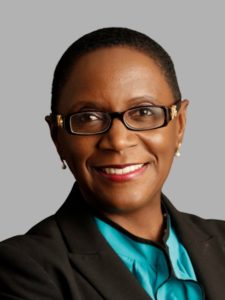
Independent Expert Member, United Nations Permanent Forum on People of African Descent; Assistant Professor of Law at the University of The Bahamas
Gaynel Curry
-
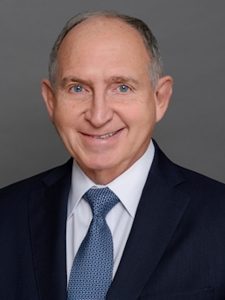
Partner, Kurzban, Kurzban, Tetzeli & Pratt; former attorney for Haiti during President Aristide’s campaign for restitution
Ira Kurzban
-
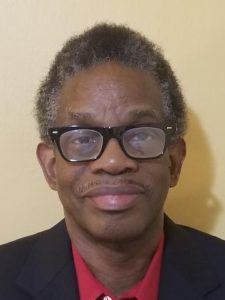
Professor, Howard University; Independent Expert - European Commission against Racism and Intolerance at the Council of Europe
Dr. Clarence Lusane
-

International law scholar and Assistant Professor, Seton Hall Law School; Founder of the Historical Redress Network
Britta Redwood (moderator)
-
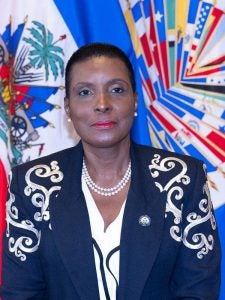
Permanent Representative of Haiti to the Organization of American States
Ambassador Myrtha Désulmé
Speaking from the heart at her alma mater, Ambassador Myrtha Désulmé framed Haiti’s present suffering as the inevitable consequence of centuries of deliberate hostility. Grounding her remarks in Michel-Rolph Trouillot’s Silencing the Past, she warned that Haiti’s story has been systematically erased and distorted, disconnecting the nation’s current instability from its revolutionary origins. Far from being naturally impoverished, Haiti, she argued, has been purposefully contained, its poverty manufactured by centuries of reparations demands, diplomatic isolation, economic embargoes, and military interventions designed to punish its audacious pursuit of freedom.
Celebrating the Haitian Revolution as the truest articulation of human rights, Désulmé reminded the audience that Haiti, unlike the United States or France, simultaneously achieved both emancipation and independence. For daring to overturn the world economic order built on slavery, she said, Haiti was condemned to centuries of sabotage. The “double debt” Haiti was forced to pay France, she explained, crippled the nation’s economy and trapped it in a cycle of poverty that persists today.
Calling reparations an urgent moral imperative, not a historical abstraction, Désulmé invoked Haiti’s leadership within the CARICOM Reparations Commission and the International Repair Campaign. Closing her remarks, she called on the next generation of legal advocates to reclaim Haiti’s rightful place in history, insisting that only through remembrance and justice can true healing begin.
Panel Three—Answering Haiti’s Call to Action
Two hundred years after the French extortion that crippled Haiti’s economy in its infancy, Haiti’s legal claim for restitution of the “Independence Debt” is the key to its future prosperity, stability, and empowerment. If successful, the claim also has the potential to unlock reparations for all people injured by slavery and the violence of colonialism.
Now is the time to mobilize for restitution for Haiti. 2025 marks the 200th anniversary of the “Independence Debt” and the beginning of the Second International Decade for People of African Descent, a central theme of which is reparatory justice for the legacies of enslavement and colonialism. Today, Haitian civil society actors, Caribbean and African Heads of State, and international human rights bodies are beginning to coalesce around Haiti’s claim for restitution. Momentum is building through the development of the Operational Eight Point Framework for Restitution for Haiti, the formation of the Working Group on Reparations and Restitutions Related to Slavery and Haitian Independence, and Haiti’s membership in the CARICOM Reparations Commission. Advocates recognize that Haiti holds the key to a brighter future, and these efforts are meant to get her to the door.
The final panel moved from history and theory to strategy and execution, focusing on how Haiti’s reparations movement can build political traction, financial infrastructure, and community trust both domestically and internationally. Moderated by IJDH Executive Director Brian Concannon, the session featured activists, lawyers, and policy experts working at the front lines of reparations advocacy.
Nixon Boumba challenged attendees to consider what social and political conditions are necessary for Haiti’s future, pointing to predatory power structures and the need for new imaginaries rooted in Haitian self-determination. Enith Williams of the Reparations Finance Lab outlined a visionary blueprint for a perpetual fund governed by a coalition of Haitians community leaders, descendants, legal scholars, and global allies to ensure restitution is collective, accountable, and strategic. Dreisen Heath emphasized the cultural violence of erasure and called for a global narrative shift to support reparative justice as not only financial, but also spiritual and psychological healing. Ivan Noisette added insights from within the U.S. legislative space, pointing to the power of diaspora-led advocacy and the need to bridge insider-outside strategies to sustain political will.
Throughout the discussion, panelists affirmed that reparations for Haiti are not a symbolic gesture but a concrete necessity. The question is no longer if, but how and more importantly, when. As one speaker noted, “This moment isn’t just timely, it’s overdue.”
-
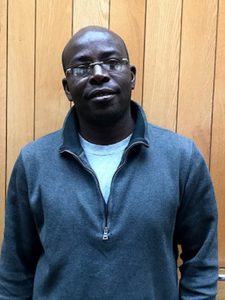
Haitian human rights activist and member of the Kolektif Jistis Min nan Ayiti (Haiti Mining Justice Collective)
Nixon Boumba
-

Reparative Justice Expert, former U.S. racial justice researcher and advocate at Human Rights Watch
Dreisen Heath
-
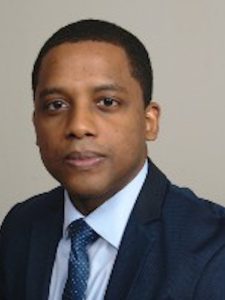
Legislative Director, US House of Representatives
Ivan Noisette
-
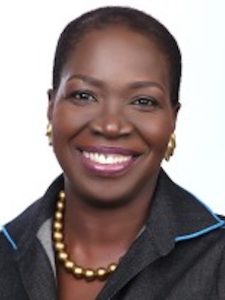
-
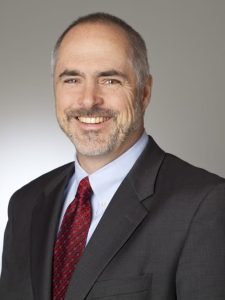
Co-Founder of the Institute for Justice and Democracy in Haiti
Brian Concannon (moderator)
